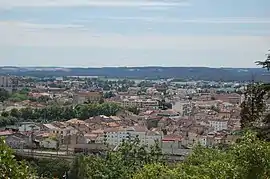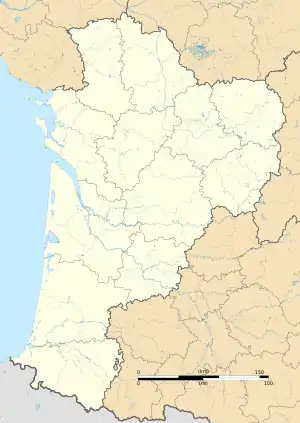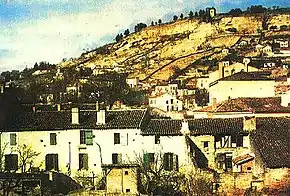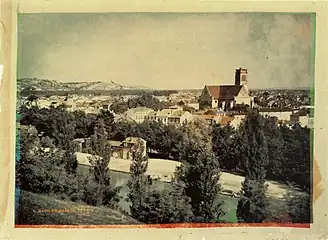Agen
The commune of Agen (French: [aʒɛ̃], locally [aˈʒɛŋ]; Occitan: [aˈdʒen]) is the prefecture of the Lot-et-Garonne department in Nouvelle-Aquitaine, southwestern France. It lies on the river Garonne 135 kilometres (84 miles) southeast of Bordeaux.
Agen | |
|---|---|
Prefecture and commune | |
 View of Agen from heights | |
 Flag .svg.png.webp) Coat of arms | |
Location of Agen | |
 Agen  Agen | |
| Coordinates: 44°12′18″N 0°37′16″E | |
| Country | France |
| Region | Nouvelle-Aquitaine |
| Department | Lot-et-Garonne |
| Arrondissement | Agen |
| Canton | Agen-1, Agen-2, Agen-3, Agen-4 |
| Intercommunality | Agglomération d'Agen |
| Government | |
| • Mayor (2020–2026) | Jean Dionis du Séjour[1] |
| Area 1 | 11.49 km2 (4.44 sq mi) |
| Population | 32,214 |
| • Density | 2,800/km2 (7,300/sq mi) |
| Time zone | UTC+01:00 (CET) |
| • Summer (DST) | UTC+02:00 (CEST) |
| INSEE/Postal code | 47001 /47000 |
| Elevation | 37–162 m (121–531 ft) (avg. 48 m or 157 ft) |
| Website | agen |
| 1 French Land Register data, which excludes lakes, ponds, glaciers > 1 km2 (0.386 sq mi or 247 acres) and river estuaries. | |
Geography
The city of Agen lies in the southwestern department of Lot-et-Garonne in the Aquitaine region. The city centre lies on the east bank of the river Garonne, the Canal de Garonne flows through the city, approximately halfway between Bordeaux 132 km (82 mi) and Toulouse 107 km (66 mi).
Climate
Agen features an oceanic climate (Cfb), in the Köppen climate classification. Winters are mild and feature cool to cold temperatures while summers are mild and warm. Rainfall is spread equally throughout the year; however, most sunshine hours are from March–September.
| Climate data for Agen, France (altitude 59 m, 1981–2010 averages, extremes 1941–present) | |||||||||||||
|---|---|---|---|---|---|---|---|---|---|---|---|---|---|
| Month | Jan | Feb | Mar | Apr | May | Jun | Jul | Aug | Sep | Oct | Nov | Dec | Year |
| Record high °C (°F) | 20.1 (68.2) |
22.3 (72.1) |
26.3 (79.3) |
30.2 (86.4) |
34.0 (93.2) |
39.3 (102.7) |
40.6 (105.1) |
41.0 (105.8) |
36.7 (98.1) |
32.0 (89.6) |
25.4 (77.7) |
21.6 (70.9) |
41.0 (105.8) |
| Average high °C (°F) | 9.2 (48.6) |
11.3 (52.3) |
15.0 (59.0) |
17.5 (63.5) |
21.5 (70.7) |
25.0 (77.0) |
27.6 (81.7) |
27.6 (81.7) |
24.5 (76.1) |
19.6 (67.3) |
13.2 (55.8) |
9.5 (49.1) |
18.5 (65.3) |
| Daily mean °C (°F) | 5.6 (42.1) |
6.8 (44.2) |
9.7 (49.5) |
12.0 (53.6) |
15.9 (60.6) |
19.3 (66.7) |
21.5 (70.7) |
21.5 (70.7) |
18.4 (65.1) |
14.7 (58.5) |
9.3 (48.7) |
6.1 (43.0) |
13.4 (56.1) |
| Average low °C (°F) | 2.1 (35.8) |
2.4 (36.3) |
4.4 (39.9) |
6.6 (43.9) |
10.3 (50.5) |
13.6 (56.5) |
15.4 (59.7) |
15.3 (59.5) |
12.3 (54.1) |
9.7 (49.5) |
5.4 (41.7) |
2.8 (37.0) |
8.4 (47.1) |
| Record low °C (°F) | −17.4 (0.7) |
−21.9 (−7.4) |
−10.5 (13.1) |
−3.9 (25.0) |
−1.6 (29.1) |
2.5 (36.5) |
5.9 (42.6) |
4.7 (40.5) |
1.0 (33.8) |
−5.0 (23.0) |
−8.8 (16.2) |
−12.1 (10.2) |
−21.9 (−7.4) |
| Average precipitation mm (inches) | 55.1 (2.17) |
52.1 (2.05) |
49.8 (1.96) |
67.6 (2.66) |
76.1 (3.00) |
58.4 (2.30) |
51.3 (2.02) |
55.0 (2.17) |
59.3 (2.33) |
64.3 (2.53) |
63.4 (2.50) |
59.8 (2.35) |
712.2 (28.04) |
| Average precipitation days (≥ 1.0 mm) | 9.9 | 8.3 | 9.0 | 10.8 | 10.6 | 8.1 | 6.3 | 7.1 | 7.9 | 9.5 | 10.0 | 9.8 | 107.1 |
| Average snowy days | 1.3 | 1.2 | 0.5 | 0.2 | 0.0 | 0.0 | 0.0 | 0.0 | 0.0 | 0.0 | 0.5 | 1.1 | 4.8 |
| Average relative humidity (%) | 89 | 85 | 79 | 77 | 77 | 75 | 73 | 76 | 79 | 86 | 90 | 91 | 81.4 |
| Mean monthly sunshine hours | 77.5 | 110.1 | 172.6 | 182.3 | 213.6 | 232.1 | 255.4 | 242.3 | 204.9 | 138.2 | 84.0 | 69.4 | 1,982.4 |
| Source 1: Météo France[3][4][5] | |||||||||||||
| Source 2: Infoclimat.fr (humidity and snowy days, 1961–1990)[6] | |||||||||||||
Toponymy
From Occitan Agen (1197), itself from Latin Aginnum (3rd century Itinéraire d'Antonin), from a Celtic root agin- meaning "rock or height".[7]
Population

|
| ||||||||||||||||||||||||||||||||||||||||||||||||||||||||||||||||||||||||||||||||||||||||||||||||||||||||||||||||||
| Source: EHESS[8] and INSEE (1968-2017)[9] | |||||||||||||||||||||||||||||||||||||||||||||||||||||||||||||||||||||||||||||||||||||||||||||||||||||||||||||||||||
Economy
The town has a higher level of unemployment than the national average. Major employers include the pharmaceutical factory UPSA.
Sights
_Mus%C3%A9e_des_Beaux-Arts_vu_de_la_place_du_Dr_Esquirol.jpg.webp)
The old centre of town contains a number of medieval buildings.
The twelfth century Agen Cathedral, dedicated to Saint Caprasius, is one of the few large churches in France with a double nave, a regional trait also found in the Church of the Jacobins in nearby Toulouse.
The Saint Hilaire church, dedicated to the theme of the Holy Trinity which the Saint in question did a lot to defend, is notable for its unusual statues in front of the Church – Moses on the right, and St Peter on the left.
The art museum, the Musée des Beaux Arts, contains artefacts, furniture and sculptures from prehistoric times onwards. The art gallery contains several hundred works, including several by Goya, and others by Bonnard and Seurat. The collection also contains a large number of works by artists who lived locally. The museum is made up of twenty or so rooms.[10]
The Canal des Deux Mers, which joins the Mediterranean with the Atlantic, crosses the river Garonne at Agen via the town's famous canal bridge.
Colour photography pioneer


Louis Arthur Ducos du Hauron (1837 – 1920), a pioneer of colour photography lived and worked in Agen. He developed practical processes for colour photography on the three-colour principle, using both additive and subtractive methods.[11][12][13] In 1868 he patented his ideas (French Patent No. 83061) and in 1869 he published them in Les couleurs en photographie, solution du problème.
The most widely reproduced of his surviving colour photographs is the View of Agen, an 1877 landscape, printed by the subtractive assembly method which he pioneered. Several different photographs of the view from his attic window, one dated 1874, also survive.
Entertainment
The municipal theatre "Théâtre Ducourneau" presents theatre, and occasionally classical concerts. The smaller "Théâtre du jour" has a resident theatre company presenting a variety of recent or older plays (Shakespeare, Beckett, as well as lesser known playwrights).
There are two cinemas, one a commercial multiscreened affair, the other an arts cinema run by a voluntary organization. The latter organizes film festivals every year.
Sport
Rugby is extremely popular in the town, and the local team, SU Agen, is enthusiastically supported. The town also serves as the base for the Team Lot-et-Garonne cycling team.
Transport
The Gare d'Agen connects Agen with Toulouse and Bordeaux as well as Périgueux. It is around an hour from Toulouse and around an hour from Bordeaux. The TGV train to Paris takes three hours and thirteen minutes with a stop in Bordeaux.
Agen is connected, by the A62 autoroute, to both Toulouse and Bordeaux.
The Agen Airport is serviced by Airlinair service to Paris Orly 6 days a week. It is also used for business and leisure flying.
Agen stands on the voie verte cycle path between the Mediterranean and close to Bordeaux.
Diocese
Agen is the seat of a Roman Catholic diocese that comprises the Département of Lot and Garonne. It is a suffragan of the archdiocese of Bordeaux.
Twin towns – sister cities
 Corpus Christi, United States
Corpus Christi, United States Dinslaken, Germany
Dinslaken, Germany Galena, Illinois, United States[16]
Galena, Illinois, United States[16] Llanelli, Wales, United Kingdom
Llanelli, Wales, United Kingdom Toledo, Spain
Toledo, Spain Tuapse, Russia
Tuapse, Russia
Notable people
_Cath%C3%A9drale_Saint-Caprais_-_Statue_de_Saint_Caprais_1844_-_Louis_Rochet_PalissyPM47000501.jpg.webp)
%252C_naturaliste_et_homme_politique_-_P2618_-_Mus%C3%A9e_Carnavalet.jpg.webp)

- As place of birth
- Saint Caprasius of Agen, a Christian martyr and saint of the 4th. century
- Phoebadius of Agen (died ca. 392) a Catholic bishop of the fourth century.
- Bernard Palissy (ca.1510–1590), potter, he may have been born in Saintes.[17]
- Joseph Justus Scaliger (1540–1609), Calvinist religious leader and scholar.[18]
- Pierre Dupuy (1582–1651), writer and scholar.[19]
- Francés de Corteta (1586-1667), nobleman and poet
- Joseph Barsalou (1600–1660), apothecary and physician.
- Godefroi, Comte d'Estrades (1607–1686), diplomatist and Marshal of France.[20]
- Bernard Germain de Lacépède (1756–1825), naturalist and active freemason.[21]
- Jean Hilaire Asté (1775–1840), professor of music and instrument-maker, inventied the ophicleide
- Jean Baptiste Bory de Saint-Vincent (1780–1846), naturalist and politician.[22]
- Jacques Jasmin (1798–1864), Provençal poet.[23]
- Victor Rabu (1834–1907), architect, built many churches in Montevideo, Uruguay
- Joseph Chaumié (1849–1919), politician
- Les Lalanne, artists and sculptors François-Xavier Lalanne (1927–2008) and Claude Lalanne (1924–2019).
- Michel Serres (born 1930), philosopher and author
- Jacques Sadoul (born 1934), novelist, book editor and non-fiction author
- Jean Cruguet (born 1939), jockey who won the U.S. Triple Crown of thoroughbred racing
- Alain Aspect (born 1947), physicist and Nobel Prize in Physics winner in 2022
- Francis Cabrel (born 1953), singer-songwriter and guitarist
- Bernard Campan (born 1958), actor, film director and writer
- Emmanuel Flipo (born 1958), artist
- Bernard Andrieu (born 1959, philosopher and historian
- Béatrice Uria-Monzon (born 1963), mezzo-soprano.[24]
- Stéphane Rideau (born 1976), actor
- Fabien Barcella (born 1983), former rugby union player with 20 caps for France
- Aymeric Laporte (born 1994), footballer with 20 caps for Spain
- Brice Dulin, (born 1990), rugby union player with 36 caps for France.
- As residence
- Julius Caesar Scaliger In 1525 he became physician to Antonio della Rovera, bishop of Agen, and remained until his death in 1558.[25]
- Nostradamus lived in Agen from 1531 until at least 1534. He was married to a local woman with whom he had two children.[26]
Miscellaneous
Agen is the "capital of the prune", a local product consumed as a sweet, either stuffed with prune purée or in pastries, or as a dessert, e.g., prunes soaked in Armagnac, a type of brandy. On the last weekend of August, a prune festival comprises rock concerts, circus performances and prune tastings.
Jewish presence
The first Jews settled in the town in the twelfth century AD. They were expelled from the town in 1306. A number of Jews returned to the town in 1315, and a "Rue des Juifs" is documented ever since this period. In 1968, about 600 Jews lived in the town, though most of them had emigrated from North Africa. A Jewish synagogue still exists in the town.[27]
See also
- SU Agen Lot-et-Garonne, a French rugby union club based in Agen
- Agenais, or Agenois, a former province of France
- Tulipa agenensis, a red tulip named after a wild colony growing near the town
References
- "Répertoire national des élus: les maires". data.gouv.fr, Plateforme ouverte des données publiques françaises (in French). 2 December 2020.
- "Populations légales 2020". The National Institute of Statistics and Economic Studies. 29 December 2022.
- "Données climatiques de la station de Agen" (in French). Meteo France. Archived from the original on 3 October 2018. Retrieved 28 December 2015.
- "Climat Aquitaine" (in French). Meteo France. Archived from the original on 20 May 2019. Retrieved 28 December 2015.
- "Agen (47)" (PDF). Fiche Climatologique: Statistiques 1981–2010 et records (in French). Meteo France. Archived from the original (PDF) on 16 April 2018. Retrieved 16 April 2018.
- "Normes et records 1961-1990: Agen - La Garenne (47) - altitude 59m" (in French). Infoclimat. Archived from the original on 24 August 2017. Retrieved 28 December 2015.
- Bénédicte Boyrie-Fénié, avec la collaboration d’André Bianchi, Pèire Boissière, Patrice Gentié et Maurice Romieu, Dictionnaire toponymique des communes du Lot-et-Garonne, Pau, Éditions Cairn, décembre 2012, 320 p. (ISBN 978-2-35068-231-0), p. 41.
- Des villages de Cassini aux communes d'aujourd'hui: Commune data sheet Agen, EHESS (in French).
- Population en historique depuis 1968, INSEE
- "Agen – Tourist Office – The History of Agen – Origins". ot-agen.org. Archived from the original on 5 May 2003. Retrieved 8 October 2009.
- "Lumière Jubilee". Time. 18 November 1935.
The idea was patented as early as 1864 [sic—actually 1868] by a now forgotten Frenchman named Louis Arthur Ducos du Hauron.
- Solbert, Oscar N.; Beaumont, Newhall; Card, James G., eds. (April 1952). "Forgotten Pioneers IV: Louis Ducos Du Hauron (1837–1920)" (PDF). Image, Journal of Photography of George Eastman House. Rochester, N.Y.: International Museum of Photography at George Eastman House Inc. 1 (6): 2. Archived from the original (PDF) on 4 March 2016. Retrieved 21 June 2014.
- Dr. Carl Finch (1920). "Louis Arthur Ducos du Hauron, In Memoriam". Photo-Era, The American Journal of Photography. Vol. 45. New England Photo Era Publishing Company. pp. 281–282.
- "Jumelages et coopérations". agen.fr (in French). Agen. Retrieved 19 April 2021.
- "2018 Annual Impact Report" (PDF). Sister Cities International. Retrieved 6 February 2023.
- Goldstein, Bennet (1 July 2019). "Galena, French sister city team up for 'La Fete en Blanc'". Telegraph Herald. Retrieved 6 February 2023.
- Burton, William (1911). . Encyclopædia Britannica. Vol. 20 (11th ed.). pp. 634–635.
- Christie, Richard Copley; Sandys, John (1911). . Encyclopædia Britannica. Vol. 24 (11th ed.). pp. 283–286, see page 284-286.
- . Encyclopædia Britannica. Vol. 8 (11th ed.). 1911. pp. 690–691.
- . Encyclopædia Britannica. Vol. 9 (11th ed.). 1911. p. 801.
- . Encyclopædia Britannica. Vol. 16 (11th ed.). 1911. p. 48.
- . Encyclopædia Britannica. Vol. 4 (11th ed.). 1911. p. 276.
- . Encyclopædia Britannica. Vol. 15 (11th ed.). 1911. p. 277.
- Uria Monzon biography
- Christie, Richard Copley; Sandys, John (1911). . Encyclopædia Britannica. Vol. 24 (11th ed.). pp. 283–286, see page 283.
- . Encyclopædia Britannica. Vol. 19 (11th ed.). 1911. p. 822.
- "Synagogues in Agen, France". Kosher Delight.